In the ever-shifting landscape of global economics, Japan finds itself grappling with the consequences of a weak yen. The currency’s decline has not only eroded the financial foundations of Japanese households but has also started to weave a narrative of escalating inflation that is hard to ignore. Itsunori Onodera, the policy chief of Japan’s Liberal Democratic Party, articulated this predicament during a recent statement that shed light on the dire need for revitalizing Japan’s industrial competitiveness to bolster the value of its currency. It seems ironic that in a world driven by globalization, the most pressing concern for Japan lies in anchoring the very currency that has historically been integral to its export-driven economy.
Amidst this struggle, the bonds between the U.S. and Japan have taken center stage, particularly as the two nations head into trade negotiations that will undoubtedly include discussions about currency policy. There is a palpable tension simmering beneath the surface, as Japan’s policymakers are acutely aware that a stronger yen could potentially hamper their already fragile export markets. As Onodera suggests, Japan should focus on enhancing the competitiveness of its companies rather than employing the weak yen for political aims. The irony is that this advice underscores a critical economic reality; an obsolete economic strategy can exacerbate vulnerabilities, leaving Japan caught between the necessity of currency valuation and competitive growth.
Inflation: A Tangible Threat
Japan’s struggle is not simply an abstract economic theory; inflation is a real threat clawing at the everyday lives of its citizens. This predicament has partially arisen out of the weak yen, which has led to escalated prices of imported goods and services. As Onodera aptly pointed out, the currency’s weakness is a significant contributing factor to this inflationary surge. The policymakers’ response appears inadequate: rather than taking decisive actions to realign the currency’s value, there is a notable reluctance to tackle this issue head-on. The inability to recognize a weak yen as a critical problem reflects a deeper complacency about national economic strategy.
Instead of taking drastic measures to strengthen the yen directly, Japan seems to be adhering to a policy of prolonged discomfort, resembling a patient who knows they must take bitter medicine but continually postpones the inevitable. The current landscape necessitates aggressive strategies to protect households from the soaring costs. Japan’s historically low interest rates, driven by the Bank of Japan’s ultra-loose monetary policy, appear increasingly outdated amid strengthening U.S. interest rates. To delay necessary changes only serves to prolong pain for the populace and puts future economic stability at risk.
The Balancing Act of Trade Relations
As Japan prepares for trade talks with the U.S., the precarious balance becomes even more pronounced. Onodera’s assertion that Japan should avoid using its holdings in U.S. Treasuries as leverage is commendable in theory but naive in practice. Economic powerhouses like the U.S. deem currency manipulation as a serious infraction; thus, Japan’s relaxed stance could be viewed as either unpreparedness or political timidity. The U.S. has continually pushed for equitable trade relations, yet Japan’s reluctance to utilize its Treasury holdings as negotiation tools smacks of an outdated deference to traditional alliances that may no longer serve its interests.
Trade negotiations should ideally be arenas of mutual benefit; however, Japan’s approach risks portraying it as a passive plaything in a game where it should be a proactive player. The nuance in this financial chess match is marked by Japan’s historical aversion to allowing the yen to appreciate too rapidly. Yet, as the yen slides to three-decade lows while inflation rises, it begs the question—how long can Japan afford to be the compliant ally when self-preservation demands something different?
Confronting Economic Realities
Ultimately, Japan’s economic landscape demands a recalibration. The issues at hand are symptomatic of embedded political structures and economic policies that have not adapted to contemporary global realities. If Japan aspires to emerge from this morass, it must undertake a robust self-assessment that prioritizes not only trade agreements and ally favoritism but also an unflinching commitment to growing its economy independently of outdated paradigms.
A strong yen is not merely a goal; it is vital for ensuring the economic health and well-being of Japanese households. The time is ripe for a bold transformation rather than timid adjustments—Japan must embrace change or risk being overshadowed in an unforgiving international arena.

Leave a Reply